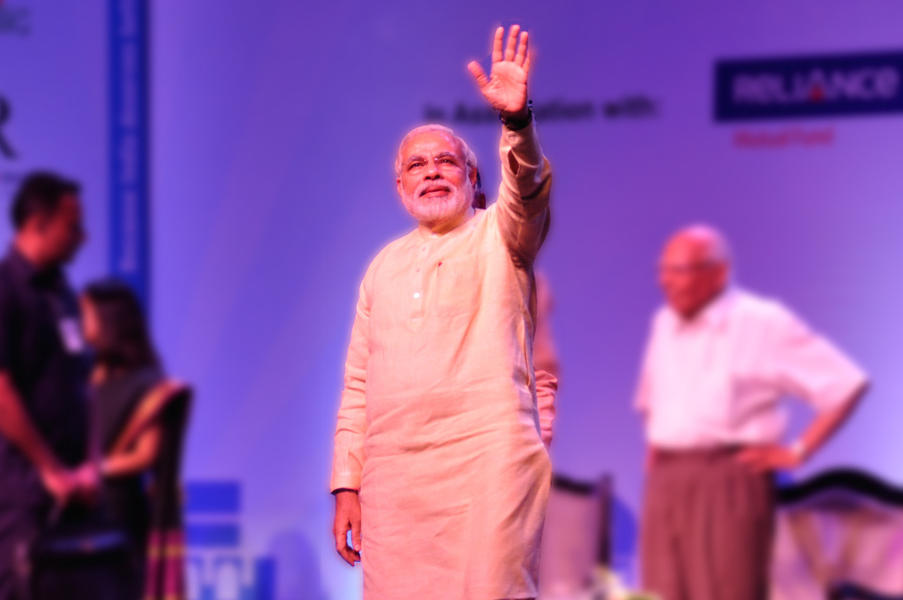Narendra Modi wants to use solar energy to bring electricity to every home in India
CC by: Narendra Modi

A free daily email with the biggest news stories of the day – and the best features from TheWeek.com
You are now subscribed
Your newsletter sign-up was successful
Newly elected Prime Minister-designate Narendra Modi is a hugely controversial figure, and how he will govern India — a country currently in an economic funk — remains unknown. Critics worry that the Hindu nationalist Modi may sow seeds of division, and stoke up religious conflict. Yet Modi largely ran his campaign on reviving the country's economy — and he does have a few big economic ideas up his sleeve.
As chief minister of Gujarat, Modi pioneered India's first incentives for large-scale solar power in 2009. And now his government plans to harness solar power to enable every home in India to run at least one light bulb by 2019. More than 400 million people in India still lack electricity. That's more than the entire population of the U.S. and Canada.
"We look upon solar as having the potential to completely transform the way we look at the energy space," Narendra Taneja, convener of the energy division of Modi's Bharitiya Janata Party, told Bloomberg.
The Week
Escape your echo chamber. Get the facts behind the news, plus analysis from multiple perspectives.

Sign up for The Week's Free Newsletters
From our morning news briefing to a weekly Good News Newsletter, get the best of The Week delivered directly to your inbox.
From our morning news briefing to a weekly Good News Newsletter, get the best of The Week delivered directly to your inbox.
He's probably right. Solar can be totally decentralized, meaning that unconnected homes can have access to power without India having to immediately roll out expensive centralized infrastructure like power lines, substations, and coal-fired power stations — previously a stumbling block to bringing electricity to the poorest in the third world.
If successful, this kind of program could provide a clean, decentralized energy template for sub-Saharan Africa, where upwards of 580 million people lack electricity.
A free daily email with the biggest news stories of the day – and the best features from TheWeek.com
John Aziz is the economics and business correspondent at TheWeek.com. He is also an associate editor at Pieria.co.uk. Previously his work has appeared on Business Insider, Zero Hedge, and Noahpinion.
-
 The ‘ravenous’ demand for Cornish minerals
The ‘ravenous’ demand for Cornish mineralsUnder the Radar Growing need for critical minerals to power tech has intensified ‘appetite’ for lithium, which could be a ‘huge boon’ for local economy
-
 Why are election experts taking Trump’s midterm threats seriously?
Why are election experts taking Trump’s midterm threats seriously?IN THE SPOTLIGHT As the president muses about polling place deployments and a centralized electoral system aimed at one-party control, lawmakers are taking this administration at its word
-
 ‘Restaurateurs have become millionaires’
‘Restaurateurs have become millionaires’Instant Opinion Opinion, comment and editorials of the day
-
 Nobody seems surprised Wagner's Prigozhin died under suspicious circumstances
Nobody seems surprised Wagner's Prigozhin died under suspicious circumstancesSpeed Read
-
 Western mountain climbers allegedly left Pakistani porter to die on K2
Western mountain climbers allegedly left Pakistani porter to die on K2Speed Read
-
 'Circular saw blades' divide controversial Rio Grande buoys installed by Texas governor
'Circular saw blades' divide controversial Rio Grande buoys installed by Texas governorSpeed Read
-
 Los Angeles city workers stage 1-day walkout over labor conditions
Los Angeles city workers stage 1-day walkout over labor conditionsSpeed Read
-
 Mega Millions jackpot climbs to an estimated $1.55 billion
Mega Millions jackpot climbs to an estimated $1.55 billionSpeed Read
-
 Bangladesh dealing with worst dengue fever outbreak on record
Bangladesh dealing with worst dengue fever outbreak on recordSpeed Read
-
 Glacial outburst flooding in Juneau destroys homes
Glacial outburst flooding in Juneau destroys homesSpeed Read
-
 Scotland seeking 'monster hunters' to search for fabled Loch Ness creature
Scotland seeking 'monster hunters' to search for fabled Loch Ness creatureSpeed Read